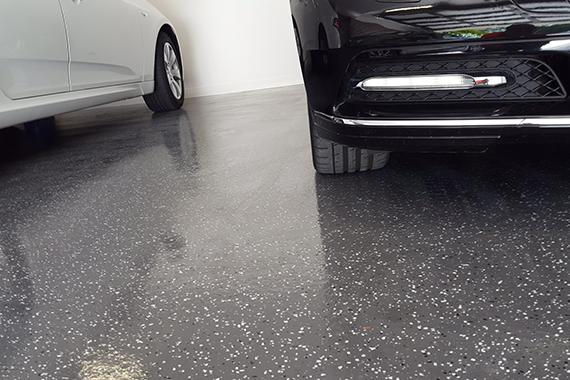
Choosing which type of flooring to install in a new or renovated industrial or commercial space is an important decision on many different levels.
The practical considerations are significant (such as durability, maintenance and cleaning) and health and safety requirements also need to be factored into your choice. Cost is another issue - as is performance. You need to choose a flooring type that is fit for purpose and proven over the long-term. Aesthetics may also be important.
With all of these factors in mind, there really is only one standout choice for industrial and commercial floors. Epoxy flooring.
Epoxy flooring is one of the safest, most hard-wearing, durable, cost-effective, versatile and attractive options and it fits in anywhere - from the harshest industrial environment to a stylish office interior.
The following FAQs will give you a comprehensive overview of this popular flooring choice:
What is epoxy flooring?
An epoxy floor is essentially a tough synthetic resin coating that is applied over a substrate (usually concrete) which hardens into a smooth, seamless, durable and long-lasting surface. There are several types of epoxy floors including self-dispersing (generally used in high-traffic commercial and industrial applications) and self-levelling (best suited to lower-impact environments such as residential floors where the look emulates a concrete floor).
Is an epoxy floor the same as an epoxy coating?
The terms are used interchangeably, but there is actually a small difference between the two and it relates to the thickness of the resin layer. If the layer is less than two millimetres thick, it’s called an epoxy coating and anything deeper than two millimetres is referred to as an epoxy floor. The decision to install a coating vs a floor depends on the particular application and how the floor is to be used.
Does epoxy flooring meet regulatory health and safety standards?
Yes. It is possible to add textured materials such as quartz sand to the liquid coating prior to application which will enhance the floor’s anti-slip, skid-resistant properties in both wet and dry conditions. If your operation needs to comply with government and HACCP requirements, always check with the flooring company that their products have been designed and rated to meet all applicable safety and quality standards.
Does epoxy flooring come in different colours?
Yes. There are literally hundreds of stylish and unique colours and finishes to choose from, plus it’s possible to demarcate individual areas or embed designs (such as a logo) into the floor. This is a key consideration from a health and safety perspective as it enables walkways, exclusion zones, line markings, pedestrian/vehicle access areas etc to be highlighted, creating a safe and clean working environment for employees and visitors.
How durable is an epoxy floor?
Epoxy flooring has a reputation as being one of the toughest surfaces available. It can withstand continuous impact from heavy foot traffic and moving machinery. It holds up extremely well against temperature extremes and damp, wet conditions. It is also stain, acid and water resistant, so it’s ideal for industrial environments where oil spills can occur and corrosive chemicals are in use.
Epoxy flooring is a far superior option to bare concrete flooring and many of the other traditional coatings which are applied over concrete. It’s an extremely tough, hard-wearing and high-performance coating which can stand up to the roughest treatment over time.
Are they easy to clean?
Yes. The resin surface is impermeable to liquids and can withstand robust cleaning regimes. High pressure hosing, hot water and even harsh chemicals can all be used with confidence on an epoxy floor.
Are there any downsides to epoxy floors?
Epoxy floors are constructed to be impact resistant, but in extreme situations, the surface may chip or crack if very heavy items are dropped onto it. However, if this does happen, it is possible to have the floor repaired and restored to its original condition.
Another consideration is that it can be tricky and time-consuming to remove or alter an epoxy floor. Carefully planning is always recommended so that no changes are necessary once the floor has been laid. A reputable installer will always take the time to discuss current and future plans for your space to make sure that the right long-term decisions are made in terms of line markings etc.
In summary
The benefits of an epoxy floor for a commercial, industrial or even residential space are well-documented.
They include:
- Superior durability and longevity
- Reliable performance against heavy and continuous foot, vehicular and machinery traffic
- Ease of cleaning and maintenance
- Stain resistance
- Impermeable to liquids
- Colour-coding to demarcate areas of flooring
- Skid and slip-resistant when combined with textured additives
- Stylish, attractive and versatile
Epoxy flooring is a durable, hygienic, safe, low maintenance and attractive flooring choice with endless design possibilities for all industries.